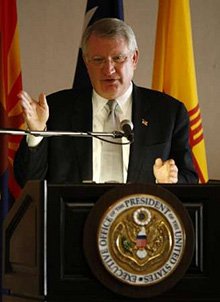 |
 |
 |
 News from Around the Americas | October 2007 News from Around the Americas | October 2007  
U.S., Mexico Plan $8.5 Billion Anti-Drug Effort
 Kristin Roberts - Reuters Kristin Roberts - Reuters
go to original


| | Director of National Drug Control and President Bush's "Drug Czar" John Walters speaks about progress in the fight against illicit drug trafficking during a news conference in San Diego, California October 2, 2007. (Reuters/Mike Blake) |
Washington - The United States and Mexico plan to unveil an $8.5 billion counternarcotics program to stem the flow of drugs headed north and curb violence among drug gangs, U.S. officials said on Tuesday.

Stephen Johnson, the Defense Department's deputy assistant secretary for Western Hemisphere affairs, said Mexico asked the United States to put up $1.5 billion for the program. Mexico will spend $7 billion, he said.

"With some 2,000 execution-style murders this year on the part of drug mafias, Mexico is under siege," Johnson told the Inter-American Dialogue, a Washington think tank.

Another U.S. government official said the Bush administration would unveil the plan as early as next week.

Johnson said no U.S. troops would be sent to Mexico as part of the counternarcotics program. U.S. funds will be used for equipment to combat narcotics trafficking.

The plan comes as the United States finds it increasingly difficult to compete with other powers in providing assistance and wielding influence in Latin America and elsewhere.

Johnson, in fact, said a maze of legal and regulatory requirements in the United States for security assistance to allies had made it difficult for Washington to compete with Russia and China.

"With limited flexibility, we now find it difficult to compete with Russia and China in security assistance," he said in the speech.

"Whereas they focus on striking deals with few strings, dealing with Washington requires running a gauntlet of human rights certifications, protecting the environment, promising not to send U.S. military personnel to the International Criminal Court, not assisting current or former terrorists, and not using U.S.-provided equipment for any other than its stated purpose."

"American commitments also depend on legislative approval on a yearly basis and can be reversed if the mood in the U.S. Congress shifts," he said.

Defense officials have complained for years about the hurdles that must be cleared before Washington can provide security assistance to allies.

But the Pentagon rarely acknowledges the difficulty of facing off in that arena against Russia and China specifically, two of America's biggest power competitors.

Within the region, Johnson said some governments in Latin America appeared to want to engage the United States. But he said Venezuela, Cuba, Bolivia and Ecuador wanted to counter Washington's influence. | 
 | |
 |



